Welcome to our comprehensive guide on sustainable coffee farming. In this article, we will explore what sustainable coffee farming is, highlight some sustainable coffee brands, and delve into the importance of ethical coffee farming practices. So, grab a cup of your favorite brew, and let’s dive in!
Key Takeaways:
- Sustainable coffee farming involves environmentally friendly and socially responsible practices.
- Sustainable coffee brands prioritize the health of the planet and coffee farmers.
- Understanding sustainable coffee farming helps make informed choices for a more ethical and sustainable coffee industry.
- Sustainable coffee farming benefits the environment, coffee farmers, and consumers.
- Certifications such as Fair Trade and Organic help identify sustainable coffee products.
The Journey of Coffee: From Bean to Brew
The journey of coffee begins with the coffee growing process. Coffee plants require specific climate conditions and are typically grown in the coffee belt, a region between the Tropics of Cancer and Capricorn. There are two main types of coffee beans: Arabica and Robusta, with Arabica being preferred by sustainable coffee brands for its taste and quality.
The coffee cherries, which contain the coffee beans, are harvested manually once they are ripe. After harvesting, the coffee cherries go through a process that involves removing the outer pulp, drying, sorting, and roasting. Fair trade practices ensure that coffee farmers receive fair prices for their crops and promote sustainable farming methods. Coffee production can have a significant environmental impact, including deforestation and water pollution, but sustainable coffee brands prioritize practices like organic farming and shade-grown coffee to minimize these effects.
Understanding the journey of coffee from bean to brew is essential for appreciating the complex processes and impacts involved in coffee production. By supporting sustainable coffee farming practices and fair trade, we can contribute to a more environmentally friendly and socially responsible coffee industry.
| Stage | Description |
|---|---|
| Harvesting | Manual harvesting of ripe coffee cherries |
| Processing | Removal of outer pulp, drying, sorting, and roasting |
| Fair Trade Practices | Ensuring fair prices for farmers and promoting sustainable farming methods |
| Environmental Impact | Deforestation, water pollution, and the importance of sustainable practices |
By understanding the coffee growing process and the environmental impact of coffee production, we can make informed choices that support sustainable coffee farming and contribute to a healthier planet. Fair trade practices also play a crucial role in improving the livelihoods of coffee farmers and fostering long-term sustainability in the coffee industry.
Benefits of Choosing Sustainable Coffee

Choosing sustainable coffee offers a multitude of benefits for the environment, coffee farmers, and consumers. Here are some of the key advantages:
Environmental Benefits
- Promotes Biodiversity: Sustainable coffee farming practices prioritize the preservation of natural habitats, promoting biodiversity conservation and protecting native plant and animal species.
- Prevents Soil Degradation: By implementing sustainable farming methods such as organic farming and soil conservation, sustainable coffee brands help prevent soil erosion and maintain soil health.
- Reduces Water Contamination: Sustainable coffee farms employ practices that minimize water pollution, ensuring the preservation of water quality for surrounding ecosystems.
- Contributes to Carbon Sequestration: Sustainable coffee farming aids in mitigating climate change by sequestering carbon dioxide, reducing greenhouse gas emissions, and promoting carbon neutrality.
Social and Economic Benefits
- Supports Coffee Farmers: Choosing sustainable coffee ensures fair income and better working conditions for coffee farmers, enhancing their livelihoods and empowering their communities.
- Promotes Fair Trade: Sustainable coffee brands often carry fair trade certifications, guaranteeing fair prices for coffee farmers and promoting ethical and sustainable farming practices.
- Invests in Community Development: Fair trade practices foster community development initiatives, providing resources for education, healthcare, and infrastructure in coffee-producing regions.
Health Benefits
- Reduces Exposure to Harmful Pesticides: Organic coffee, a common choice in sustainable coffee brands, is grown without the use of synthetic pesticides, reducing potential health risks for consumers.
- Higher Antioxidant Levels: Organic and sustainably grown coffee often has higher levels of antioxidants, which contribute to a healthier diet and offer potential health benefits.
By choosing sustainable coffee, we can make a positive impact on the environment, support fair trade practices, and enjoy the benefits of a healthier and more ethical cup of coffee.
Identifying Sustainable Coffee
When it comes to choosing sustainable coffee, it’s important to know how to identify it. One way to ensure that your coffee is produced using environmentally friendly and socially responsible practices is to look for trusted certifications. Certifications such as Fair Trade, Organic, Rainforest Alliance, or Smithsonian Bird-Friendly indicate that the coffee meets certain sustainability standards.
When reading coffee labels, pay attention to the origin, farming practices, and certifications. Look for information that highlights sustainable farming methods, such as organic farming, shade-grown coffee, or biodiversity preservation. This information can help you make informed decisions and support brands that prioritize sustainability.
In addition to certifications, consider the packaging of the coffee. Sustainable coffee brands often use eco-friendly materials, such as recyclable or compostable packaging. By choosing coffee with sustainable packaging, you can further reduce your environmental footprint.
| Certification | Description |
|---|---|
| Fair Trade | This certification ensures that farmers receive fair prices for their crops and promotes sustainable farming practices. |
| Organic | Coffee with the organic certification is grown without the use of synthetic pesticides or fertilizers. |
| Rainforest Alliance | This certification indicates that the coffee comes from farms that prioritize environmental conservation and social responsibility. |
| Smithsonian Bird-Friendly | This certification ensures that the coffee is grown in a way that preserves bird habitats and promotes biodiversity. |
By understanding how to interpret coffee labels and recognizing reputable certifications, you can confidently choose sustainable coffee that aligns with your values and supports a more sustainable coffee industry.
Leading Sustainable Coffee Brands
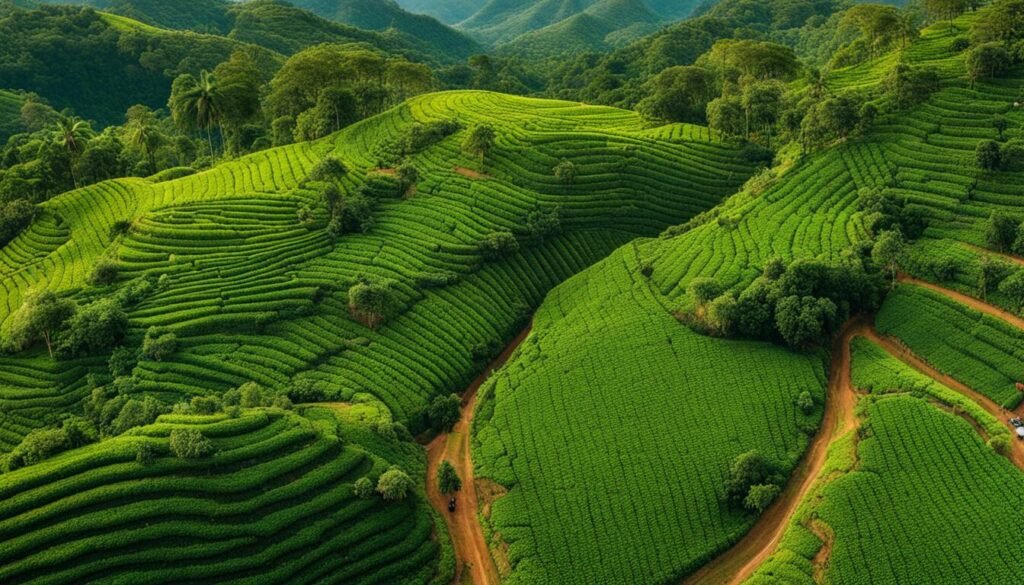
When it comes to supporting sustainability in the coffee industry, several brands stand out for their commitment to ethical and eco-friendly practices. These leading sustainable coffee brands prioritize not only the quality of their coffee but also the well-being of the planet and coffee farmers. By choosing products from these brands, consumers can make a positive impact on the environment and support fair trade practices.
Ethical and Eco-Friendly Coffee Brands
The following table highlights some of the leading sustainable coffee brands:
| Brand | Description |
|---|---|
| Starbucks | A globally recognized brand that has made significant strides in sustainable sourcing, with goals to achieve 100% ethically sourced coffee by 2020. |
| Dunkin’ Donuts | Committed to responsibly sourcing their coffee and supporting farmers through various initiatives, including the Rainforest Alliance Certified™ program. |
| Peet’s Coffee | A brand known for its high-quality coffee and dedication to sourcing ethically and sustainably grown beans, including Fair Trade and organic options. |
| Green Mountain Coffee | An industry leader in sustainable practices, offering a wide range of Fair Trade and organic coffees while supporting coffee-growing communities. |
These brands have made significant efforts to promote sustainability throughout their supply chains, from sourcing coffee beans in an environmentally responsible manner to supporting fair prices for farmers. By choosing coffee from these brands, consumers can enjoy their favorite cup of joe with the knowledge that they are supporting a more sustainable coffee industry.
Brewing and Enjoying Sustainable Coffee at Home
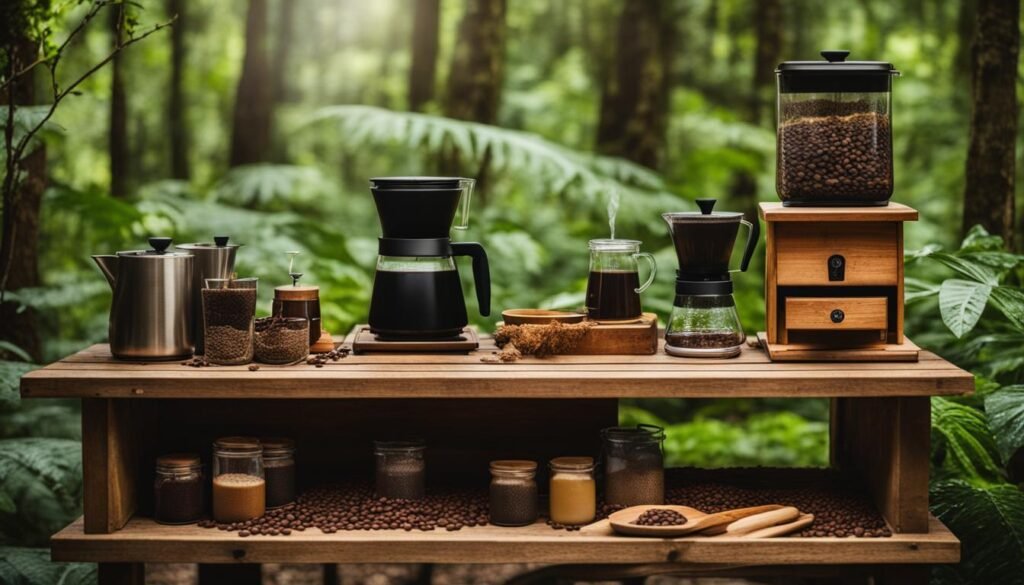
At home, we can continue our commitment to sustainability by adopting eco-friendly brewing methods. By making conscious choices, we can reduce waste and minimize our environmental impact. A few popular eco-friendly brewing methods include French press and pour-over. These methods eliminate the need for single-use coffee pods, which often end up in landfills, contributing to plastic waste. Instead, they rely on reusable filters and produce a rich, flavorful cup of coffee.
To further reduce our ecological footprint, we can choose reusable coffee filters made from sustainable materials. These filters are not only eco-friendly but also cost-effective in the long run. Additionally, using mugs made from sustainable materials, such as bamboo or stainless steel, helps us avoid disposable cups and reduces waste.
Pairing sustainable coffee with sustainable food choices enhances our commitment to a greener lifestyle. Selecting organic or locally sourced foods to enjoy with our coffee contributes to a more sustainable and ethical food system. By supporting local farmers and choosing products that are grown using environmentally friendly practices, we can make a positive impact on both our health and the planet.
Eco-friendly Brewing Methods
Here are some eco-friendly brewing methods to consider:
- French press: This method uses a simple plunger system that extracts the flavors and essential oils from the coffee grounds. It requires no disposable filters and produces a full-bodied, flavorful cup of coffee.
- Pour-over: Using a cone-shaped dripper and a paper or reusable filter, pour-over brewing allows for precise control over the extraction process. It produces a clean, smooth cup of coffee.
- Cold brew: Cold brew coffee is brewed using cold water over an extended period, typically 12 to 24 hours. This method reduces the energy consumption associated with hot brewing and results in a smooth, low-acid cup of coffee.
By embracing eco-friendly brewing methods and making sustainable food choices, we can enjoy our coffee guilt-free, knowing that we are contributing to a more sustainable future.
Understanding the Significance of Coffee Processing

Coffee processing is a crucial step in the journey from raw coffee cherries to the flavorful brew we enjoy. Different processing techniques can have a significant impact on the taste and aroma of the final cup. Let’s explore some common coffee processing techniques and their effects on the flavor profile.
One of the most common methods is the wet processing or washed process. In this technique, the coffee cherries are pulped to remove the outer skin, leaving behind the sticky mucilage. The beans are then fermented in water to break down the remaining pulp, after which they are thoroughly washed. This process often produces a clean, bright, and acidic cup of coffee.
Another method is the dry processing or natural process. In this technique, the coffee cherries are dried with the fruit fully intact. The cherries are spread out in the sun or placed in drying machines for several weeks until they reach the desired moisture level. Once dried, the cherries are hulled to remove the outer skin and parchment. This process often results in a sweeter, fuller-bodied cup with fruity and earthy undertones.
Lastly, we have the semi-washed processing method. This technique combines elements of both the wet and dry processes. The coffee cherries are partially pulped, removing some but not all of the outer skin and pulp. The beans are then dried with the remaining fruit intact before being hulled. This method can produce a cup of coffee with balanced flavors, combining the brightness of wet-processed coffee with the body and sweetness of dry-processed coffee.
The Impact on Coffee Flavor
The choice of coffee processing technique can greatly influence the flavor of the final brew. Wet processing often results in a cleaner and brighter cup, with more pronounced acidity. Dry processing tends to produce a sweeter and fuller-bodied cup, with fruity and earthy flavors. Semi-washed processing offers a balanced combination of brightness and body. It’s fascinating to explore the different flavors that can be achieved through various processing methods.
| Processing Technique | Flavor Profile |
|---|---|
| Wet processing | Clean, bright, acidic |
| Dry processing | Sweet, full-bodied, fruity, earthy |
| Semi-washed processing | Balanced brightness and body |
Sustainable Coffee Farming and Biodiversity Preservation
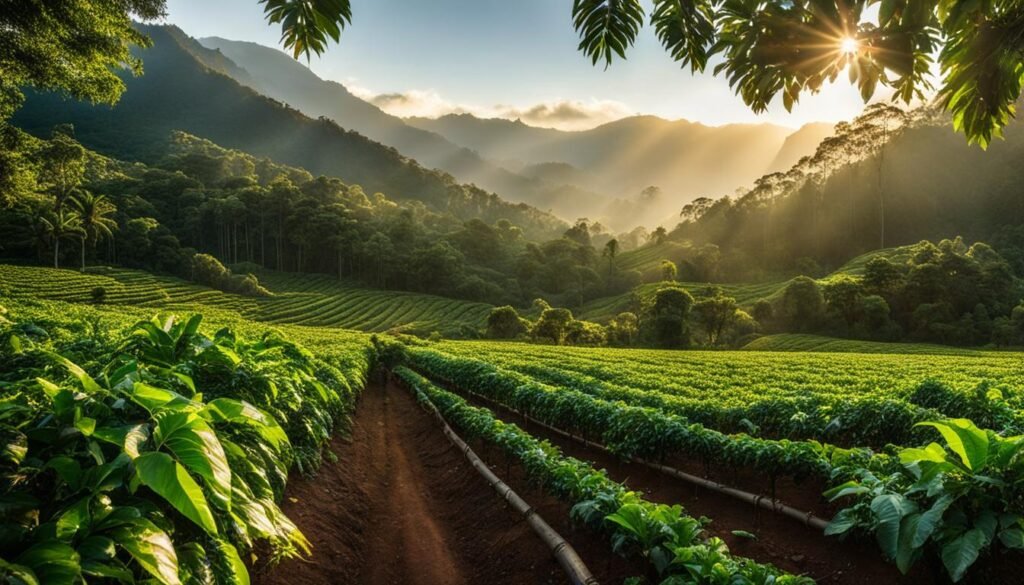
Sustainable coffee farming practices, such as shade-grown coffee, play a vital role in preserving biodiversity. Shade-grown coffee involves growing coffee trees under a canopy of larger trees, creating a diverse ecosystem that provides habitats for birds, insects, and other wildlife. This method helps maintain ecological balance and protects native plant species. By supporting shade-grown coffee, we contribute to the preservation of biodiversity and the health of ecosystems where coffee is grown.
Biodiversity Conservation
- Shade-grown coffee farms create habitats for migratory birds, contributing to bird conservation efforts.
- The diverse ecosystem supports a variety of insects, which in turn attract larger wildlife species.
- Native plant species thrive under the shade of larger trees, promoting plant diversity.
- Preserving biodiversity helps maintain the overall health and resilience of ecosystems.
Environmental Benefits
- Shade-grown coffee farms reduce the need for clearing large areas of land, minimizing deforestation.
- The larger trees provide natural shade, reducing the need for artificial irrigation and minimizing water usage.
- The diverse ecosystem contributes to soil health and prevents erosion.
- Shade-grown coffee farms sequester carbon dioxide, helping to mitigate climate change.
Social and Economic Implications
- Shade-grown coffee supports the livelihoods of coffee farmers by providing additional income opportunities through the sale of shade trees, fruits, and other products.
- Preserving biodiversity enhances the overall well-being of coffee farming communities by promoting a sustainable and resilient agricultural system.
- Shade-grown coffee encourages a more holistic approach to coffee farming, recognizing the importance of both environmental and social sustainability.
| Benefits of Shade-Grown Coffee | Conservation of Biodiversity | Environmental Sustainability | Social and Economic Implications |
|---|---|---|---|
| Provides habitats for birds, insects, and other wildlife | Protects native plant species | Reduces deforestation | Supports the livelihoods of coffee farmers |
| Contributes to bird conservation efforts | Enhances overall ecosystem health | Minimizes water usage | Promotes a sustainable agricultural system |
| Promotes plant diversity | Prevents soil erosion | Sequesters carbon dioxide | Encourages a holistic approach to farming |
The Importance of Fair Trade in Coffee Farming
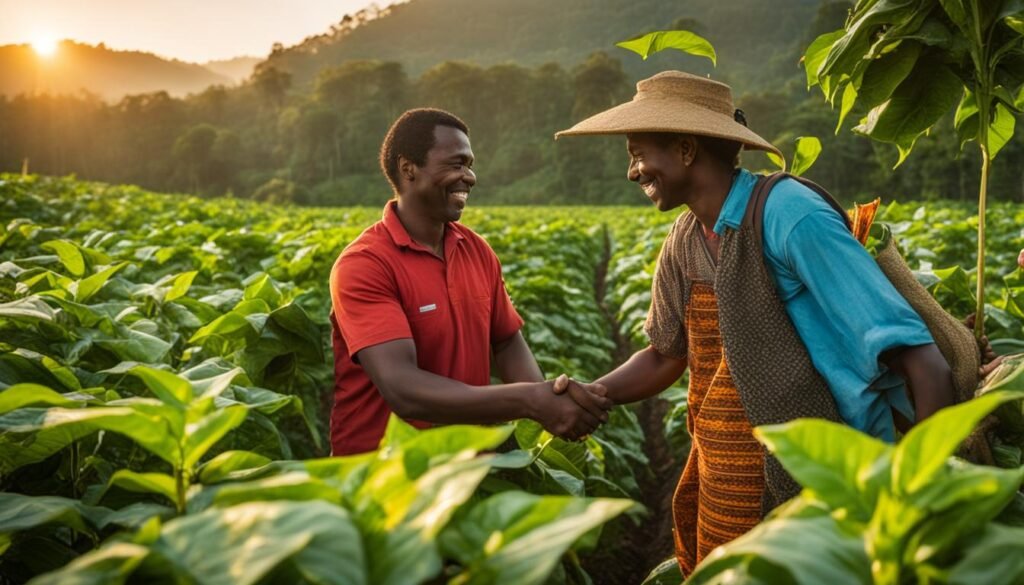
Fair trade practices in coffee farming are essential for creating a sustainable and just coffee industry. Fair trade certification ensures that coffee farmers receive fair prices for their crops, leading to improved livelihoods and economic stability. By choosing fair trade coffee, consumers directly support the well-being of coffee farmers and their communities.
One of the main benefits of fair trade coffee is the guarantee of fair prices. Coffee farmers often face price fluctuations in the global market, which can make it challenging for them to earn a livable income. Fair trade practices ensure that farmers are paid a fair and stable price for their coffee, providing them with financial security and the ability to invest in their farms and communities.
Beyond economic benefits, fair trade also promotes sustainable farming methods. Many fair trade coffee producers prioritize organic farming practices, which reduce the use of harmful chemicals and support environmental preservation. By choosing fair trade coffee, consumers contribute to the sustainability of the coffee industry and help protect ecosystems in coffee-growing regions.
Benefits of Fair Trade Coffee for Farmers:
- Stable and fair prices for coffee crops
- Improved livelihoods and economic stability
- Investment in community development
- Promotion of sustainable farming practices
Fair trade coffee is a powerful tool for creating a more equitable and sustainable coffee industry. By supporting fair trade practices, we can make a positive impact on the lives of coffee farmers while enjoying a delicious cup of coffee.
The Future of Sustainable Coffee Farming
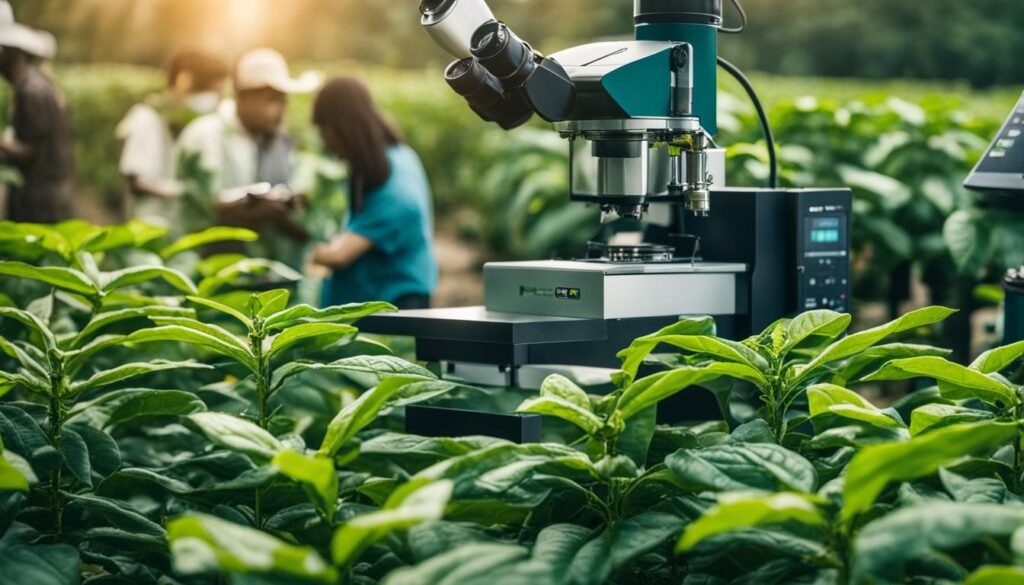
Sustainable coffee farming is continuously evolving as advancements in coffee production research and technology shape the industry’s future. We are witnessing remarkable developments that will drive positive change in the way coffee is grown and produced. Researchers and scientists are exploring innovative techniques to improve coffee yield, quality, and sustainability, ensuring a more ethical and environmentally friendly coffee industry.
Advancements in coffee production research are focused on developing disease-resistant coffee varieties. By creating coffee plants that are less susceptible to diseases and pests, farmers can reduce the need for chemical pesticides and promote healthier farming practices. This not only benefits the environment but also ensures the long-term economic viability of coffee farming.
The Role of Technology
Technology plays a crucial role in sustainable coffee farming. Precision agriculture, for example, utilizes satellite imagery, drones, and sensors to monitor crop health, optimize resource usage, and reduce environmental impact. With the help of these advanced tools, farmers can better manage irrigation, fertilization, and pest control, leading to more efficient and sustainable farming practices.
Climate-smart farming methods are also gaining traction in the coffee industry. These methods aim to mitigate the effects of climate change on coffee production by implementing strategies such as shade management, soil conservation, and water resource management. By adapting to changing climate conditions, coffee farmers can ensure the long-term viability of their crops and protect the ecosystems in which coffee is grown.
The Promise of a Sustainable Future
The future of sustainable coffee farming holds great promise. By embracing advancements in coffee production research and adopting technology-driven practices, we can create a more sustainable and resilient coffee industry. This not only benefits coffee producers and consumers but also the planet as a whole. The demand for sustainable coffee continues to grow, and by supporting ongoing research and innovation, we can drive positive change in agriculture and create a more sustainable future for coffee farming.
| Advancements in Coffee Production | Impact |
|---|---|
| Disease-resistant coffee varieties | Reduces the need for chemical pesticides and promotes healthier farming practices |
| Precision agriculture | Optimizes resource usage, reduces environmental impact, and improves crop management |
| Climate-smart farming methods | Adapts to changing climate conditions and ensures long-term viability of coffee crops |
Conclusion
Sustainable coffee farming is crucial for a more ethical and environmentally friendly coffee industry. Choosing sustainable coffee brings a multitude of benefits. Firstly, it helps preserve the environment by promoting biodiversity, preventing soil degradation, and reducing water contamination. Additionally, sustainable coffee farming supports coffee farmers by providing fair income and improving their livelihoods. Fair trade practices ensure farmers receive better prices for their crops and invest in community development. Moreover, choosing organic coffee reduces exposure to harmful pesticides and offers higher levels of antioxidants, contributing to a healthier diet.
Understanding the journey of coffee from bean to brew and identifying sustainable coffee brands allows us to make informed choices. By brewing and enjoying sustainable coffee at home, we can further enhance sustainability efforts. Using eco-friendly brewing methods and opting for reusable materials help reduce waste and minimize environmental impact. It is also important to understand the significance of coffee processing, as different techniques influence the flavor profile of our favorite brews.
The future of sustainable coffee farming holds promise. Advancements in research and technology are driving positive changes in coffee production, leading to improved yield, quality, and sustainability. By supporting sustainable coffee, we contribute to a coffee culture that benefits both the planet and the people involved in coffee production. Let us embrace the benefits of choosing sustainable coffee to create a brighter and more sustainable future together.
FAQ
What is sustainable coffee farming?
Sustainable coffee farming refers to the cultivation and production of coffee using environmentally friendly and socially responsible practices such as organic farming, fair trade, shade-grown coffee, and biodiversity preservation.
Why is sustainable coffee farming important?
Sustainable coffee farming is important because it supports environmentally friendly practices, promotes social and economic improvements for coffee farmers, and provides health benefits for consumers.
How can I identify sustainable coffee?
Look for trusted certifications such as Fair Trade, Organic, Rainforest Alliance, or Smithsonian Bird-Friendly. Consider the packaging materials and read coffee labels to find information about the origin, farming practices, and certifications.
What are the benefits of choosing sustainable coffee?
Choosing sustainable coffee has environmental benefits such as biodiversity preservation and reduced water contamination. It also supports fair income for coffee farmers, social improvements, and offers health benefits due to reduced pesticide exposure and higher antioxidant levels.
Which brands are leading the way in sustainable coffee farming?
Some well-known brands that prioritize sustainability in their coffee farming and production processes include Starbucks, Dunkin’ Donuts, Peet’s Coffee, and Green Mountain Coffee.
How can I make brewing and enjoying coffee at home more sustainable?
Use eco-friendly brewing methods such as French press or pour-over, choose reusable coffee filters and mugs made from sustainable materials, and pair sustainable coffee with sustainable food choices.
What is the significance of coffee processing?
Coffee processing plays a crucial role in transforming raw coffee cherries into the final product we enjoy. Different processing techniques have an impact on the flavor profile of the coffee.
What is shade-grown coffee?
Shade-grown coffee involves growing coffee trees under a canopy of larger trees, creating a diverse ecosystem that supports biodiversity and preserves native plant species.
What is fair trade coffee?
Fair trade coffee ensures that coffee farmers receive fair prices for their crops, improves working conditions, and promotes sustainable farming methods. Fair trade certification guarantees socially and economically fair coffee production.
What does the future of sustainable coffee farming look like?
The future of sustainable coffee farming holds promise with advancements in research and technology, including disease-resistant coffee varieties, precision agriculture, and climate-smart farming methods. It aims to create a more sustainable and resilient coffee industry.
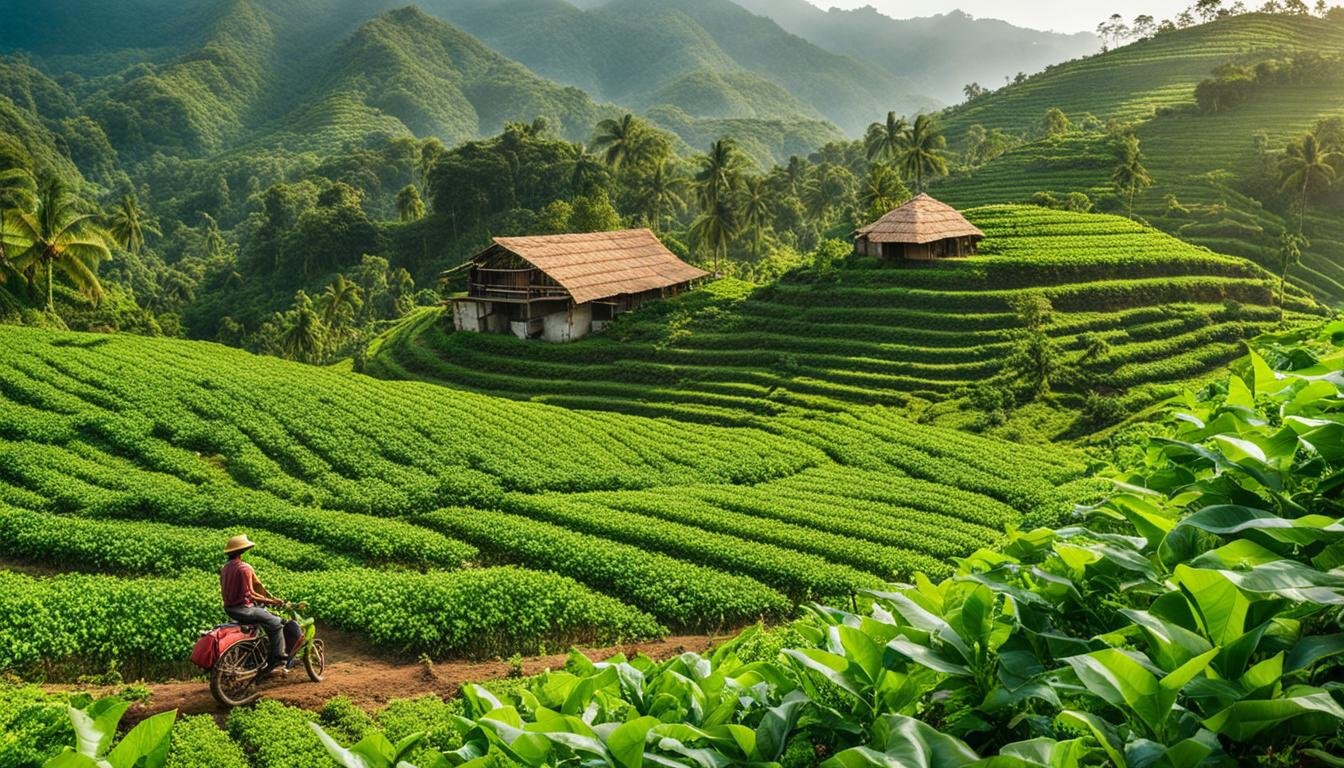
Leave a Reply